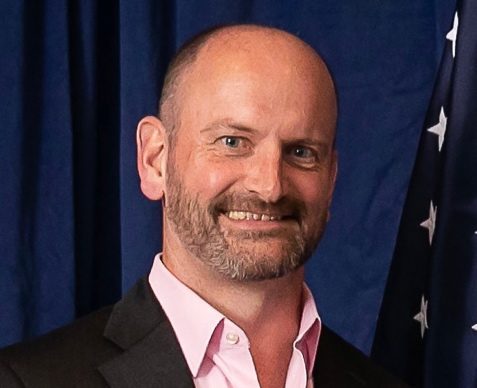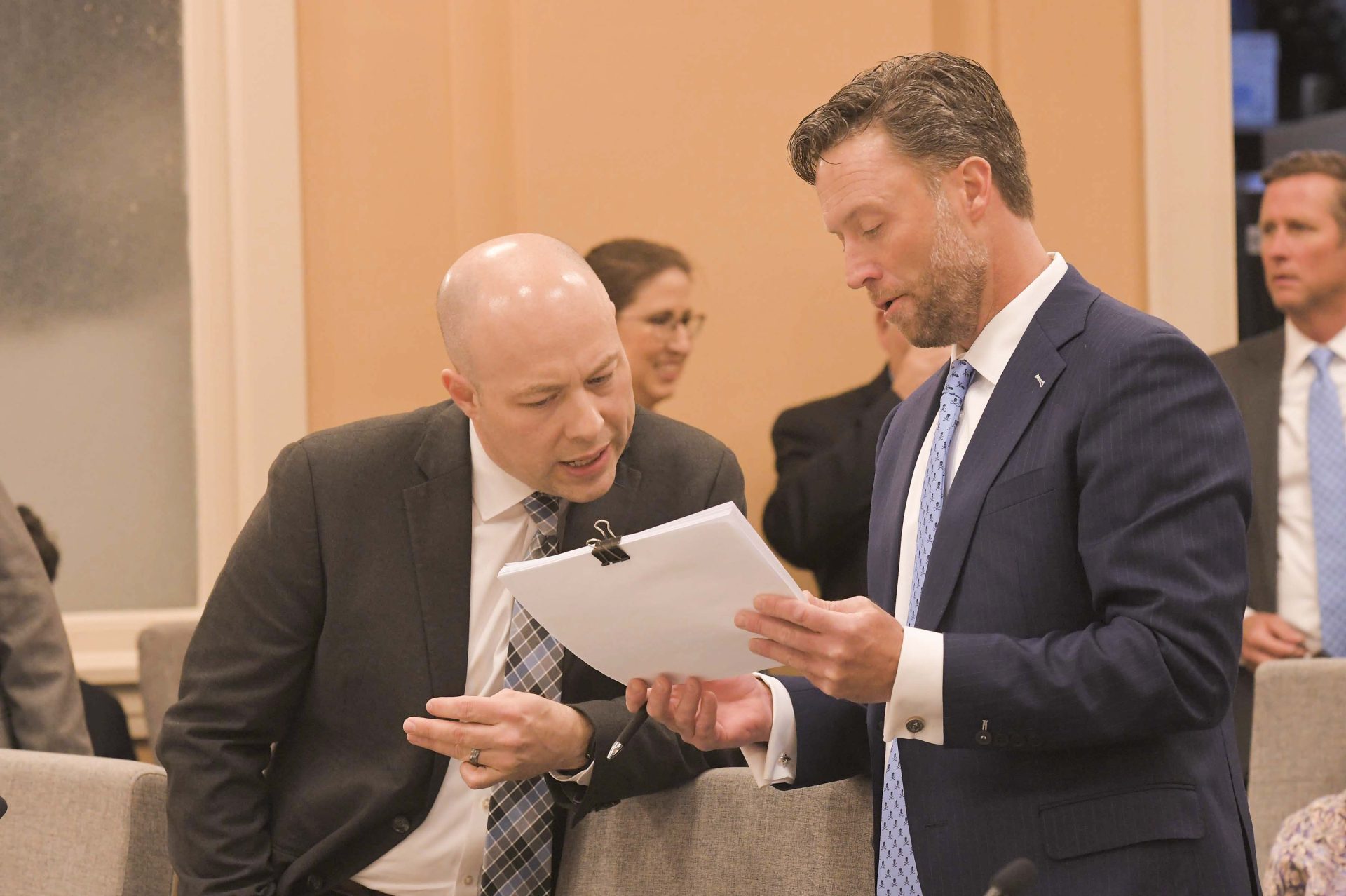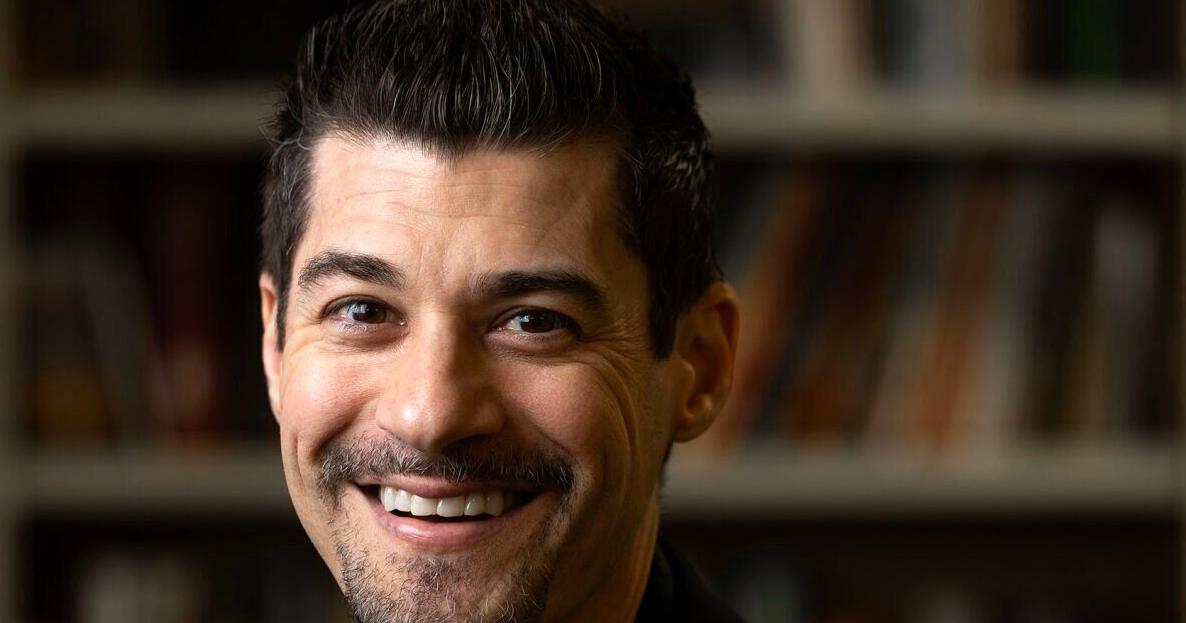Politics
Inside GOP plan to force as many votes on Mayorkas impeachment trial as possible
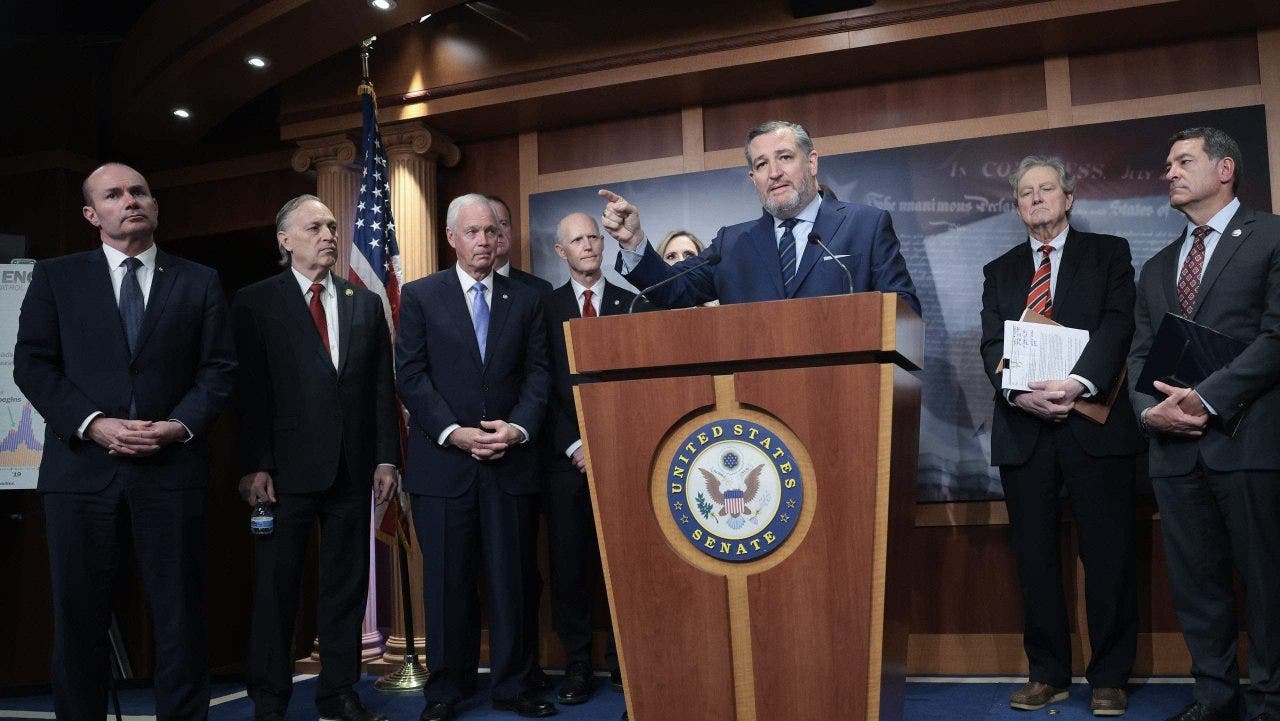
Senate Republicans are looking to hold as many votes as possible during the initial proceedings of the impeachment trial into Department of Homeland Security Secretary Alejandro Mayorkas before Democrats in the chamber are expected to succeed in dismissing the trial.
Majority Leader Chuck Schumer, D-N.Y., explicitly stated his intent to seek a dismissal of the House-passed articles of impeachment during a speech on the Senate floor on Wednesday morning. While he had previously indicated that he wanted to quickly get past the proceedings, he had yet to confirm the Democratic plan to dismiss the trial.
According to five Senate Republican sources familiar with the discussions, the structure of the proceedings is being negotiated with the Democrats.
SENATORS TO BE SWORN IN FOR MAYORKAS IMPEACHMENT TRIAL AHEAD OF EXPECTED DISMISSAL
Sen. Ted Cruz (R-TX) speaks during a press conference with other senators and House impeachment managers at the U.S. Capitol on April 16, 2024 in Washington, D.C. The bicameral group of legislators called the press conference to urge Senate Minority Leader Sen. Chuck Schumer to hold an impeachment trial after the House delivered articles of impeachment today against Secretary of Homeland Security Alejandro Mayorkas. (Photo by Win McNamee/Getty Images)
The two parties are looking into a potential agreement for unanimous consent, in which Republicans are allowed to propose eight total points of order against the motions to dismiss. Each point of order, or fact that senators determine whether there is agreement on, will require its own vote. Lengthening the process and requiring Democrats to go on record on several components of the impeachment articles against Mayorkas.
Schumer noted in his chamber floor speech on Wednesday that he would look to appease Republicans by allowing both points of order and debate time. “When we convene in trial today to accommodate the wishes of our Republican Senate colleagues, I will seek an agreement for a period of debate time that would allow Republicans to offer a vote on trial resolutions, allow for Republicans to offer points of order and then move to dismiss,” he said.
HOUSE DELIVERS MAYORKAS IMPEACHMENT ARTICLES TO SCHUMER, SETTING UP TRIAL PROCEEDINGS

Senate Majority Leader Chuck Schumer, D-N.Y., joined by Sen. Sheldon Whitehouse, D-R.I., right, speaks to reporters following a closed-door policy meeting at the Capitol in Washington, D.C., on Tuesday, March 7, 2023. (AP Photo/J. Scott Applewhite)
This agreement will require that no senator objects, and Schumer urged them not to.
The unanimous consent agreement which is being sought between the parties would allow 90 minutes of open debate after the senators are sworn in as jurors at 1:00 p.m. Then, two resolutions would receive votes, one from Sen. Mike Lee, R-Utah, calling for a full Senate trial, and another from Sen. Ted Cruz, R-Texas, that would refer the matter to a Senate Impeachment Trial committee first.
Representatives for Lee and Cruz did not confirm the unanimous consent agreement discussions before the time of publication.
GOP SENATOR EYES LEGISLATION TO DEFUND ‘PROPAGANDIST’ NPR AFTER SUSPENSION OF WHISTLEBLOWER

Sen. Mike Lee (R-UT) and Republican Senators criticize Democrats and Senate Majority Leader Chuck Schumer (D-NY) for his expected use of procedural hurdles to avoid trying to impeach Secretary of Homeland Security Alejandro Mayorkas, Washington, D.C., on April 9, 2024. House impeachment managers are expected to deliver articles of impeachment on April 10, 2024. (Photo by ALLISON BAILEY/Middle East Images/AFP via Getty Images)
One source noted the GOP was making an effort to use every option possible to require more votes within the impeachment trial process, putting their Democratic colleagues on record as much as possible.
Following the proposal of each point of order and prior to voting, the deal being discussed for unanimous consent would require four minutes of debate ahead of each vote. This time would be equally divided between the parties. One source explained that some Republican senators see this debate time as an opportunity to have the case for Mayorkas’s impeachment heard on the floor, even if it is not in the context of a full trial.
SENATE DEMS REVEAL MASSIVE $79M AD SPEND TO PROTECT MAJORITY AHEAD OF KEY MATCHUPS

If Democrats’ motion to table an impeachment trial of DHS Secretary Alejandro Mayorkas in the Senate, five vulnerable lawmakers, Sens. Bob Casey, Sherrod Brown, Jacky Rosen, Tammy Baldwin and Jon Tester, could determine the outcome. (Getty Images)
Several Senate Republican sources also indicated that the dismissal route, which Schumer revealed he planned to take, was preferable to a motion to table. Tabling the trial has never happened with an impeachment, as GOP senators have noted, and it also does not provide the ability for any arguments from impeachment managers or defense counsel or debate between senators.
If agreed to, the Mayorkas impeachment trial is likely to ultimately see dismissal, but Republicans will have several opportunities to put Democrats, particularly vulnerable ones who are up for re-election in pivotal states, on the record on multiple immigration and border related topics.

Politics
Stefanik hits special counsel Jack Smith with ethics complaint, accuses him of election meddling

House GOP Conference Chair Elise Stefanik, R-N.Y., is filing an ethics complaint against special counsel Jack Smith on Tuesday, accusing him of violating Department of Justice (DOJ) standards and trying to tip the election against former President Trump.
In a letter sent to the DOJ’s Office of Professional Responsibility, Stefanik urged the government watchdog to investigate Smith over accusations of “abusing the resources of the federal government to unlawfully interfere with the 2024 presidential election.”
“Jack Smith’s multiple attempts to rush to trial the federal January 6th case against President Trump violated long-standing, explicit Justice Department policy,” Stefanik wrote.
“Further, Jack Smith’s repeated violations of the United States District Court for the District of Columbia’s stay of proceedings are a lawless breach of trial ethics and lawyerly conduct. Jack Smith’s actions brought disrepute to the Justice Department and the federal government as a whole, and he should face discipline appropriately.”
CLICK HERE FOR THE LATEST FOX NEWS POLLING IN THE 2024 ELECTION
House GOP Conference Chair Elise Stefanik is hitting special counsel Jack Smith with an ethics complaint. (Getty Images)
Smith’s case against Trump, stemming from accusations he tried to overturn the 2020 election, was supposed to go to trial in March but has been stuck in limbo as the Supreme Court weighs the ex-president’s claim he is immune to criminal prosecution for actions taken while in the White House.
The former U.S. attorney and human rights prosecutor petitioned the high court multiple times to reject Trump’s immunity claims and bid to delay his trial, including most recently on April 8.
Stefanik’s complaint accused him of first trying to influence the election in August 2023, when Smith petitioned for a Jan. 2, 2024 trial.
ERIC TRUMP WARNS BRAGG, WILLIS ‘WANT TO TORTURE MY FATHER’ BUT NO ONE ‘IS BELIEVING IT’
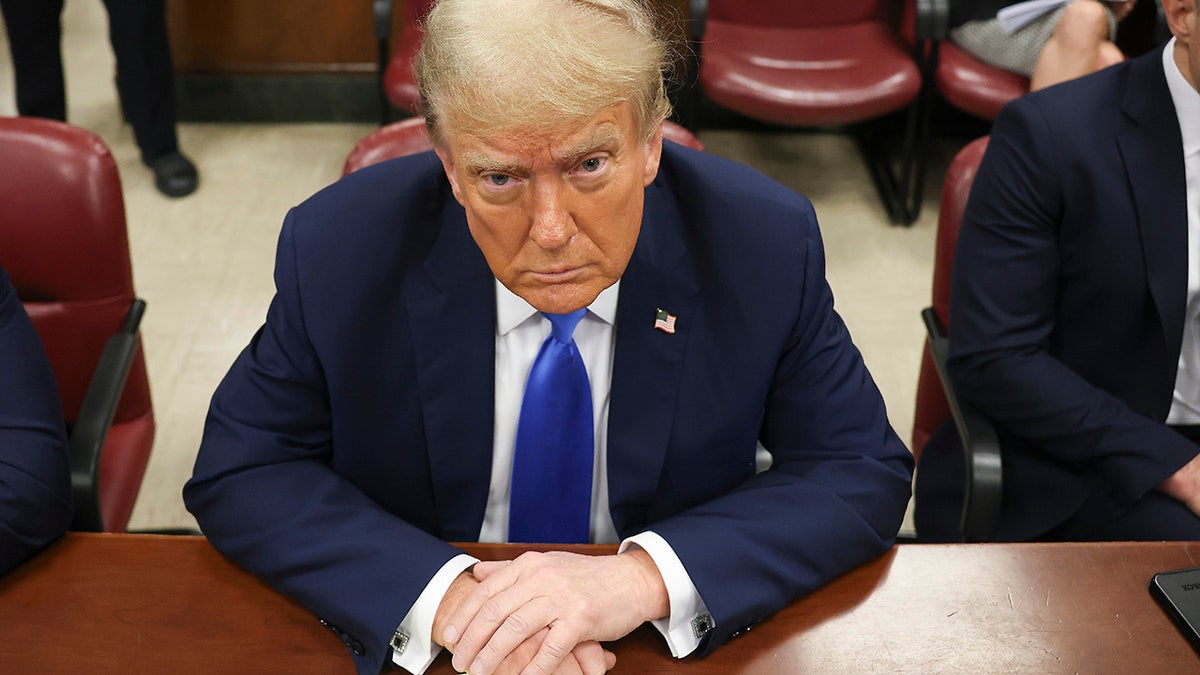
Rep. Elise Stefanik accused special counsel Jack Smith of trying to influence the 2024 election against former President Trump. (AP Photo/Yuki Iwamura, Pool)
“There exist approximately thirteen million pages of discovery for President Trump to review, plus thousands of hours of camera footage. Prosecutors bringing a case of this complexity — with so many consequential and novel legal issues to sort out — would normally never seek to bring it to trial within five months,” she argued.
“The only reason to push for such an early trial date was to work to get the case tried before the November election, and the Justice Department Manual clearly forbids Jack Smith from taking any action on that basis.”
She also cited Smith’s petitions with the Supreme Court and used his own comments in court that no American is “above the law” as further argument that he should support an investigation into his conduct.
FANI WILLIS SHOULD FACE GAG ORDER IN TRUMP ELECTION CASE, SAYS LEGAL ANALYST
“If that is true, then he should be open to, and welcome, an ethics investigation into conduct that, on its face, implicates potential violations of DOJ policy and multiple rules of professional conduct,” Stefanik said. “Biden special counsel Jack Smith’s highly unusual and clearly improper attempts to expedite trial, and his blatant violation of District Court orders, evidence his partisan attempt to influence the results of the 2024 presidential election.”
The Supreme Court, which has a 6-3 conservative majority, heard arguments in Trump’s immunity case last week. A final decision is expected in June — with the likelihood of a trial before the presidential election being slim.
Fox News Digital reached out to the DOJ for comment.
Politics
Opinion: California's budget deficit will force difficult cuts. This one should be the easiest

California is facing a multibillion-dollar budget deficit that will require lawmakers and the governor to make painful decisions. Nobody wants less funding for their child’s school, road maintenance, environmental progress or other essential services.
There is one area, however, where spending can and should be cut: prisons. Thousands of California prison beds are not in use. Simply consolidating and closing some facilities could ultimately save the state hundreds of millions of dollars.
This can be accomplished safely thanks to important reforms that have confronted our state’s incarceration crisis and reduced its prison population. According to the California Department of Corrections and Rehabilitation, nearly 130,000 people were in state custody in 2019; by the end of last year, that number had dropped to 96,000, a decrease of about 25%.
Today the state’s prison population is down to roughly 93,000. That leaves a surplus of about 15,000 prison beds, a number that is expected to grow to 19,000 in four years as the population continues to decline. It’s fiscally irresponsible to maintain those beds while social safety net programs are on the chopping block.
The empty beds mean that beyond the excess prisons, we’re continuing to incur unnecessary billions in staff, operations and maintenance costs. Consolidating and deactivating prisons provides a straightforward way to address the state’s budget deficit over the long term.
Gov. Gavin Newsom has closed two prisons and eight yards — each state prison typically comprises several yards — and discontinued one private prison contract, with another prison closure slated for next year. Even with these reductions, however, the vacancies are equivalent to four or five more empty prisons.
New York offers an example of what’s possible. With a prison population that has halved since 1999, the state has closed dozens of facilities in recent years. Gov. Kathy Hochul has proposed closing five more in the coming fiscal year.
California should follow suit. The state’s nonpartisan Legislative Analyst’s Office recently estimated that the state could save $1 billion in operating expenses annually and up to an additional $2 billion in capital expenses by closing five prisons. Otherwise, the office expects one-fifth of the state’s prison capacity to go unused.
A billion dollars a year could not only help close this and future deficits but also support real public safety measures: safety-net programs, education, housing and workforce development. The state’s current corrections budget is nearly $15 billion. The state’s general fund budget for the University of California? Under $5 billion.
Do we want updated school textbooks or surplus prison beds? Desperately needed affordable housing or unneeded prison yards? Should we pay people to watch an empty cell or build transportation infrastructure?
The Legislature should consider requiring corrections officials to rein in our sprawling prison system. Fortunately, an Assembly committee last week passed legislation that provides a road map for corrections officials to gradually and practically reduce excess capacity to 2,500, the number they have said they need to maintain operational flexibility. The bill also allows for situations in which the corrections department can make the case that an increase in beds is justified.
We understand that the administration is grappling with a need to invest more in rehabilitation as well as court mandates on prison capacity. The corrections department has struggled for many years to maximize rehabilitation and reduce recidivism. We believe making smart reductions to prison spending will free up more funding for community investment and rehabilitation, making Californians safer.
Assembly Bill 2178 answers the governor’s call for prison capacity reductions driven by data and need. It provides a pragmatic and flexible framework for such decisions. It also aligns with Newsom’s vision of a fiscally prudent, forward-thinking California.
Every dollar we spend on incarceration is one we don’t spend on building homes, supporting students and fighting climate change. With so many vital programs in jeopardy, we have a moral imperative to put the broader needs of Californians ahead of empty prisons.
Phil Ting is a Democratic Assembly member from San Francisco and the author of AB 2178. Amber-Rose Howard is the executive director of Californians United for a Responsible Budget.
Politics
Democratic mayor joins Kentucky GOP lawmakers to celebrate state funding for Louisville

The amount of state funding headed to Kentucky’s largest city to support downtown renewal, education, health care and other priorities shows that the days of talking about an urban-rural divide in the Bluegrass State are “now behind us,” Louisville’s mayor said Monday.
The new two-year state budget passed by the Republican-dominated legislature will pump more than $1 billion into Louisville, reflecting the city’s role as an economic catalyst that benefits the entire state, lawmakers said.
KENTUCKY LAWMAKERS APPROVE BILL TO FILL SENATE VACANCY BY SPECIAL ELECTION RATHER THAN BY DEMOCRATIC GOVERNOR
Republican legislators and Louisville’s first-term Democratic mayor, Craig Greenberg, spoke of the collaboration they achieved during the 60-day legislative session that ended two weeks ago.
“For far too long, folks have talked about this urban-rural divide that has divided Louisville and the rest of the state,” Greenberg said at a news conference attended by a number of lawmakers in downtown Louisville. “Well those days are now behind us.”
“We may not agree on every issue,” he said. “What we have shown this session is that’s OK. There is so much common ground. There is so much that we do agree on.”
There was no mention of divisive issues — past and present — that prompted some Democratic lawmakers and others to proclaim that the predominantly rural GOP legislature was waging a “war on Louisville.” During the just-ended session, Republican lawmakers enacted a measure to make mayoral elections nonpartisan in Louisville, the state’s most Democratic city. And lawmakers undid efforts in Louisville and Lexington to ban landlords from discriminating against renters who use federal housing vouchers.
A cyclist rides a bike in view of the Louisville, Ky., skyline, June 7, 2016, in Louisville. The amount of state funding headed to Kentucky’s largest city to support downtown renewal, education, health care and other priorities shows that the days of talking about an urban-rural divide in the Bluegrass State are “now behind us,” Louisville’s mayor said Monday, April 29, 2024. (AP Photo/David Goldman)
Perhaps the most explosive issue is still pending. Lawmakers agreed to create a task force to review the public school system that encompasses Louisville. The review could potentially lead to efforts next year to split up Jefferson County Public Schools, the state’s largest school system.
Sen. Gerald Neal, the state Senate’s top-ranking Democrat, noted at Monday’s event that there remain “some unanswered questions” regarding the legislature’s relationship with Louisville. But Neal praised his colleagues for approving the funding for his hometown, referring to the $100 million over two years for downtown Louisville as a “home run.”
Other projects winning legislative funding will make improvements at Louisville’s airport, support a community center for teens and adults with disabilities, build on the Louisville Orchestra’s statewide presence and support the Kentucky Exposition Center, which hosts trade shows throughout the year.
University of Louisville President Kim Schatzel said the session produced historic levels of funding for the school. The budget supports development of a new health sciences building in downtown Louisville that will produce more health professionals and advance cutting-edge research, she said.
The state also will help develop a cybersecurity center at UofL that will put the city and state “on the map as a national leader in this emerging and incredibly important technology field,” Schatzel said.
“Construction and cranes on campus, well, they warm a president’s heart like nothing else, as they signal confidence in a very bright future for the university and the communities that we serve,” she said.
Lawmakers passed a more than $128 billion main budget for the state executive branch over the next two fiscal years. They also approved tapping into the state’s massive budget reserves for nearly $3 billion in spending on one-time investments in infrastructure and community projects.
House Speaker David Osborne said the Louisville investments resulted from disciplined budgeting since the GOP gained House control in 2017, consolidating Republican dominance of the legislature.
For successive budget cycles after that, “this legislative body has spent less money than we have taken in,” the Republican speaker said. “That is not an easy thing to do.”
Republican Senate President Robert Stivers said that Louisville serves a mission stretching far beyond its boundaries in education, health care, transportation, tourism and the humanities. Stivers, who represents an eastern Kentucky district, said the state’s investments in Louisville were a matter of economics.
“You don’t turn away from 18 to 19% of your population and your revenues that you take in to the state coffers,” he said.
-

 World1 week ago
World1 week agoShipping firms plead for UN help amid escalating Middle East conflict
-

 Politics1 week ago
Politics1 week agoICE chief says this foreign adversary isn’t taking back its illegal immigrants
-

 Politics1 week ago
Politics1 week ago'Nothing more backwards' than US funding Ukraine border security but not our own, conservatives say
-

 Education1 week ago
Education1 week agoVideo: Dozens of Yale Students Arrested as Campus Protests Spread
-

 News1 week ago
News1 week agoThe San Francisco Zoo will receive a pair of pandas from China
-

 World1 week ago
World1 week agoBrussels, my love? The EU single market is not sexy enough for voters
-

 World1 week ago
World1 week agoEU sanctions extremist Israeli settlers over violence in the West Bank
-

 Politics1 week ago
Politics1 week agoDemocrats hold major 2024 advantage as House Republicans face further chaos, division


